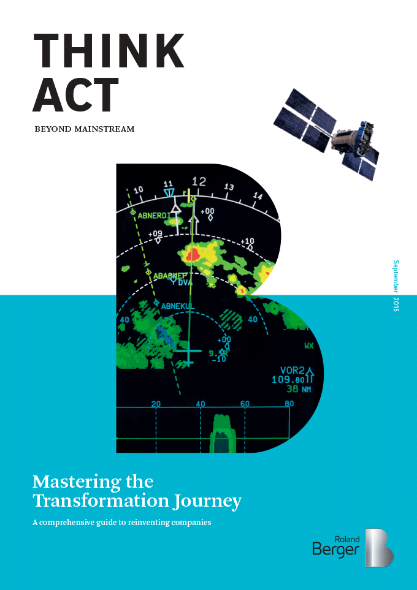Master Transformation Journey
![{[downloads[language].preview]}](https://www.rolandberger.com/publications/publication_image/cover_masteringtransformation_1_download_preview.png)
Transformation may seem complex, but it can be achieved through simple, well-structured, and effective action.


The future is more uncertain than ever, with new conditions and technologies that can leave businesses questioning how to adapt or take action. Changing customer expectations and internal problems can further hamper development, pulling a business into a strategic drift where simply keeping up becomes a struggle. "New conditions and circumstances can erode a company's position in no time at all," says Dr. Tim Zimmermann, Senior Partner at Roland Berger. "The maxim "never change a winning team" is no longer valid. This can lead to an organization losing touch with the market—a phenomenon we call strategic drift," adds Berger Senior Partner Michel Vlasselaer.
Yet, transformation has never been more accessible—nor is it something for times of crisis alone. Managers know that transformation is a survival strategy, but 48% of them do not consider themselves adequately prepared to effect crucial change. When 51% of those affected were asked, they named leadership support the most important factor in successful transformation. Drawn from our years of experience and proven toolbox of techniques, our study into mastering the transformation journey identifies a five-tiered approach to empowering and reinventing your company.
In the first tier, awareness, we identify why the change must occur. We explore the problems a business faces, analyze trends, look at the business in context, and peer into internal operations. The second tier, ambition, is focused on creating a new vision and a roadmap for the future in addition to outlining the transformation objectives and identifying the individuals with leadership qualities who will help in the transition. Third is arrangement, where we ask how we can structure the change and begin to do detailed transformation work and communicate to others involved. The process is very much underway at tier four, action, and quick wins are communicated to the team to keep momentum up. People with leadership qualities have assumed important roles and are helping lead the transition. Finally, tier five is anchoring. At this point, you must evaluate your achievements and plan for the future.


![{[downloads[language].preview]}](https://www.rolandberger.com/publications/publication_image/cover_masteringtransformation_1_download_preview.png)
Transformation may seem complex, but it can be achieved through simple, well-structured, and effective action.